Hyundai
Elantra Tail Light Bulbs Replacement Guide
How to change a burnt out brake, rear
turn signal or side marker light bulb in a 6th generation 2017 to 2020 Elantra.
By Paul B. Michaels Author & Photographer Auto Mechanic Since 1989 |
||
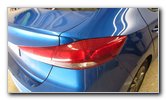 2018 Elantra Tail Lights |
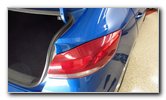 Open Trunk Lid |
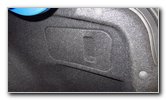 Fabric Access Cover |
| This automotive
maintenance tutorial was specifically written to assist owners of the 6th
generation (2017, 2018, 2019, 2020 and maybe also the 2021 model
year) Hyundai Elantra sedan in changing a burnt out brake, rear turn signal
or side marker light bulb in the tail light housings (or upgrading them to
brighter LED units). Owners of other Hyundai, Genesis or Kia vehicles such as the Sonata, Accent, Veloster, Ioniq, Kona, Nexo, Venue, Tucson, Santa Fe, Palisade, G70, G80, G90, Soul, Sportage, Niro, Sorento, Telluride, Rio, Forte, Optima, Stinger, Cadenza, K900, Sedona and Seltos may also find these DIY instructions to be helpful. The compatible replacement light bulb part numbers are as follows: Brake # P21/5W (also known as 7528), Rear Turn Signal # 1156A or 1156NA (Amber) and Rear Side Marker # 2825 (also known as W5W). If you would like to have brighter tail lights, install some P21/5W LED, 1156A LED and 2825 LED bulbs. The tools needed to remove the tail light housing in order to access and replace the bulbs include a 10mm socket with a 1/4" drive ratchet or a 10mm wrench and possibly a plastic pry bar tool. The first two steps are to open the trunk lid and then move to the side of the car with the burnt out light bulb. (If you need to replace the bulbs in the trunk lid housing, check out the 2017-2020 Hyundai Elantra Reverse & Parking Light Bulbs Replacement Guide.) Look inside the trunk and locate the rectangular shaped fabric access cover attached to the cargo area liner just in front of the tail light housing. |
||
|
|
||
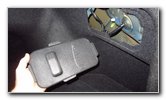 Pull Out Access Panel |
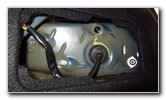 Locate Two Nuts |
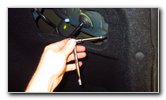 Loosen Counterclockwise |
| Gently pull the
access cover out of the cargo area liner.
Locate the two small nuts that secure the tail light housing to the rear corner of the vehicle. Loosen the nuts by turning them in the counterclockwise direction with a 10mm socket and a 1/4" drive ratchet. I found that using a short extension bar made it easier to loosen the nuts. (On some model years, the two nuts may require an 8mm socket instead of a 10mm socket.) |
||
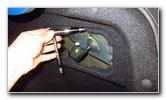 Remove Second Nut |
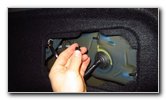 Spin Off By Hand |
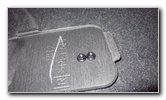 Two Nuts Removed |
| Spin off the two
nuts the rest of the way by hand to prevent them from falling down into the
rear bumper cover. Set the two nuts aside in a safe place. |
||
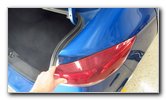 Pull Housing Off Car |
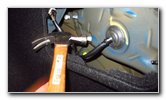 Tap To Loosen Two Pegs |
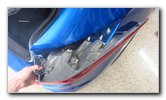 Light Housing Removed |
| Carefully pull the
tail light housing straight off the rear corner of the vehicle. The tail light housing is still held in place by two pegs inserted into plastic grommets and a slot attached to the button head of a plastic pop rivet. If you have trouble loosening the friction fasteners, use a hammer or the handle of a screwdriver to tap on the pegs from within the cargo area. You can also use a plastic pry bar tool to very carefully and gently pry along the outer edge of the tail light housing. Avoid using excessive force to prevent from cracking the lens cover. Once you loosen the friction fasteners, slide the tail light housing straight off the rear corner of the vehicle. |
||
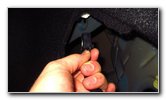 Disconnect Power Plug |
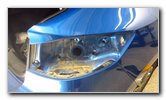 Rear Corner of Vehicle |
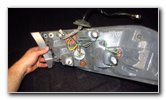 Back Side of Housing |
| Push in the release
tab on the electrical connector inside the trunk before sliding the power
plug straight out of its socket. Gently remove the rubber grommet and the electrical connector from the hole behind the tail light housing. Set the tail light housing down on a soft surface such as inside the trunk to prevent from scratching the lens cover. |
||
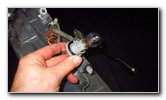 Brake Light Bulb Socket |
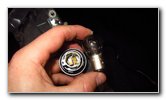 Push Down & 1/4 Turn CC |
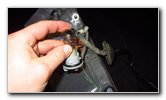 Install New Light Bulb |
| The large grey
plastic bulb socket contains the brake (stop lamp) light bulb. Rotate the bulb socket 1/4 turn in the counterclockwise direction before pulling it straight out of the housing. Push the old bulb down into the socket and rotate it 1/4 turn in the counterclockwise direction before pulling it straight out. Push a new bayonet style number P21/5W light bulb down into the socket and rotate it 1/4 turn in the clockwise direction to secure it into place. If you would like to have brighter brake lights, install some compatible replacement P21/5W LED bulbs. |
||
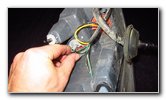 1/4 Turn Clockwise - Lock |
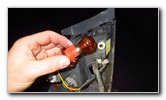 Rear Turn Signal Light |
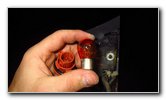 Push Down 1/4 Turn CC |
| Re-insert the brake
light bulb socket back into the housing and rotate it 1/4 turn in the
clockwise direction to secure it into place. The orange plastic bulb socket contains the rear turn signal light bulb. Rotate the bulb socket 1/4 turn in the counterclockwise direction before pulling it straight out of the housing. Push the old light bulb down into the socket and rotate it 1/4 turn in the counterclockwise direction before pulling it straight out of the socket. |
||
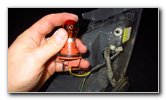 Install New Turn Signal |
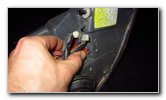 1/4 Turn Clockwise - Lock |
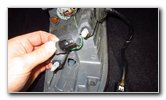 Rear Side Marker Bulb |
| Push a new bayonet
style number
1156A amber colored light bulb
down into the socket and rotate it 1/4 turn in the clockwise direction to
secure it into place. If you would like to have brighter rear turn signal lights, install some compatible replacement 1156A LED bulbs. Re-insert the rear turn signal light bulb socket into the housing and rotate it 1/4 turn in the clockwise direction to secure it into place. The small bulb socket on the outer corner of the light housing contains the rear side marker bulb. Rotate the bulb socket 1/4 turn in the counterclockwise direction before pulling it straight out of the housing. |
||
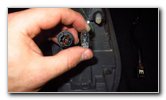 Pull Out Old Light Bulb |
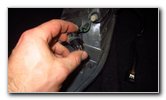 Push In New Light Bulb |
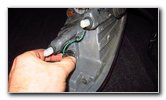 1/4 Turn Clockwise - Lock |
| Pull the old light
bulb straight out of the socket. Push a new miniature wedge base number 2825 light bulb straight into the socket. If you would like to have brighter rear side marker lights that will also last a lot longer before burning out, install some compatible replacement 2825 LED bulbs. Re-insert the bulb socket into the housing and rotate it 1/4 turn in the clockwise direction to secure it into place. |
||
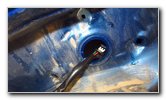 Insert Plug & Wires |
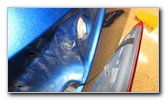 Line Up Slot & Pop Rivet |
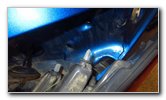 Line Up 2 Pegs & Holes |
| Hold the tail light
housing near the rear corner of the vehicle. Insert the electrical connector through the opening in the sheet metal and through to the cargo area. Secure the rubber grommet on the wiring loom to the opening in the sheet metal to keep rain water from entering the cargo area. Line up the slot and two pegs on the rear of the tail light housing with the pop rivet button head and the two small holes on the rear corner of the vehicle. |
||
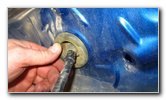 Secure Rubber Grommet |
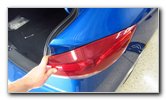 Slide On Tail Light Housing |
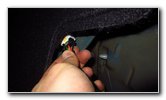 Push In Power Plug |
| Carefully slide the
tail light housing back into place on the rear corner of the car. Move to the inside of the trunk. Push the electrical connector straight into the socket until you hear or feel it "click" securely into place. |
||
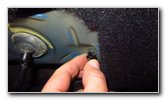 Spin On Two Nuts |
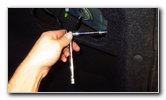 |
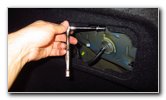 Tighten Clockwise |
| Spin on the two
nuts a few turns by hand in the clockwise direction.
Tighten the two nuts in the clockwise direction with the 10mm socket and a 1/4" drive ratchet until they are snug. (Some model years may be equipped with 8mm nuts instead of 10mm fasteners.) Try to avoid over tightening the nuts to prevent from cracking the plastic tail light housing. |
||
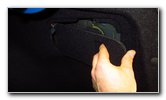 Replace Access Cover |
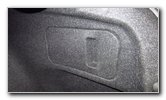 Access Cover Secured |
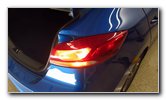 Test New Tail Light Bulbs |
| Push the fabric
access cover back into place on the carpeted trunk liner. To test the new tail light bulbs, have an assistant step on the brake pedal, turn on the parking lights and activate the hazard signals. Check out my 2017-2020 Hyundai Elantra Reverse & Parking Light Bulbs Replacement Guide if you need to change those bulbs in the light housing attached to the trunk lid. For more, please check out all of my
2017-2020 Hyundai Elantra DIY Repair & Maintenance Guides. |
||
| If you found this guide to be helpful,
please consider making a small donation by clicking on the PayPal.com
"Donate" button located to the right of this paragraph. Thank you!
(Note: I am not a registered charity. Donations are not tax deductible.) |

